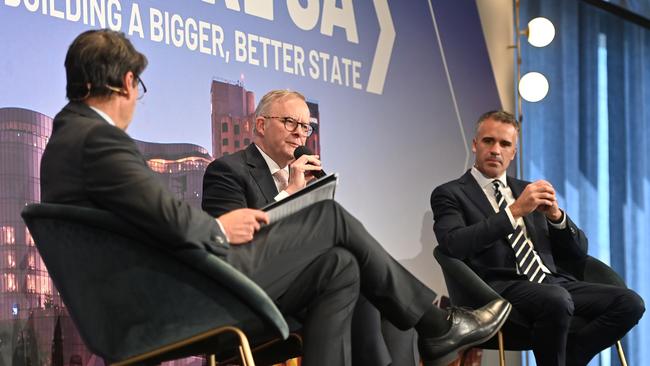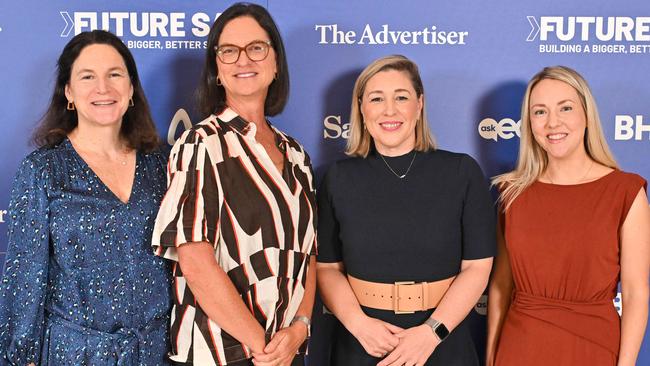Prime Minister Anthony Albanese has said he would debate the opposition leader “anytime, anywhere’
‘Anytime, anywhere’. Prime Minister Anthony Albanese has thrown down the challenge at The Advertiser’s Future SA forum for the opposition leader.
SA News
Don't miss out on the headlines from SA News. Followed categories will be added to My News.
Prime Minister Anthony Albanese has set the scene for a nuclear smackdown, saying he would debate the opposition leader “anytime, anywhere” after the coalition earmarked a power station at Port Augusta in a direct challenge to SA’s world-leading renewables plan.
Speaking alongside Premier Peter Malinauskas at The Advertiser’s Future SA forum at SkyCity on Friday, Mr Albanese said the conversation “only acted as a distraction” from investment in renewable energy.

He stood steadfast on Labor’s stance against nuclear energy, again arguing the economic figures did not stack up for Australia.
“I think that nuclear power operates effectively in France and in some countries, but here it doesn’t,” he said.
“What I would say is, if you can find me one financier to put up their hand and say: ‘Yep, I’ve got $20bn’, then I’ll take you seriously.”
Opposition Leader Peter Dutton wants to legalise nuclear power, overturning a late 1990s ban, and have the first large-scale plant running by the 2030s.
A policy release is planned before the May federal budget.
Sites for five or six nuclear power stations across Australia, in NSW, Victoria and beyond, are poised to be announced by the opposition in a policy designed to replace retiring coal-fired plants.
The Prime Minister said Australia risked lagging behind the globe if debate slowed progress and backed in the Malinauskas government’s 100 per cent renewables net electricity generation target, throwing down the gauntlet to the coalition leader.
“I’m happy to debate on site, whatever site he proposes, because frankly it’s a distraction and the problem is that it doesn’t present just an academic argument … what it does is divert attention from what investors need, which is certainty going forward,” he said.
“There is certainty in investing in renewables, there is certainty in investing in manufacturing breakthroughs.
“Every 10 years there’s been a nuclear debate, it’s a cul-de-sac that leads you back to the same place.
“We need things to happen, we cannot afford in this country to stand still – because no-one else is and the world will go past us.
“That’s why I think this debate should be called out for what it is, a bunch of people who don’t want to act on climate change who want to run a scare campaign.”
The premier echoed the sentiment, saying there was “no evidence” Australia’s population could sustain nuclear power on an economic scale.
“Let’s dispense with the ideology and have a genuine debate about what is in the interests of consumers in this country when it comes to power,” Mr Malinauskas said.
Premier refuses to follow “bad idea”
Premier Peter Malinauskas has flatly rejected suggestions the SA government could follow in the footsteps of the Victorian Labor government in shutting off the state’s gas supply, telling The Advertiser’s Future SA forum it was simply a “bad idea”.
Mr Malinauskas said decarbonisation and carbon capture would be key to achieving net zero by 2050 and bolstering SA’s economic growth, heralding energy giant Santos’ investment in a $335m carbon capture and storage facility at Moomba.

“100 per cent renewables doesn’t mean we won’t have gas, quite the opposite,” he said.
“We’ll be using gas-fired power on a frequent or a semi-frequent basis to fill up the renewables and we’ll be exporting to the rest of the country by 2050.”
Santos executive vice president Brett Darley said he believed gas would be around for “many decades”, spruiking the company’s carbon capture facility as the “next step” in SA’s energy journey.
He said the technology would be the equivalent of 235,000 cars being taken off the road when it came into operation toward the end of 2024.
“We are not just talking about studies and talking about lowering carbon, we’re actually doing it” Mr Darley said.
“Industries are looking to decarbonise and we can help with that, CCS is one way to do that – it’s here now, it’s not new technology.”
Mr Darley said gas was an “important transitional fuel” as the state moved toward renewable energy, and believed SA was in a key position – with extensive renewable resources and infrastructure – to become a powerhouse energy exporter.






